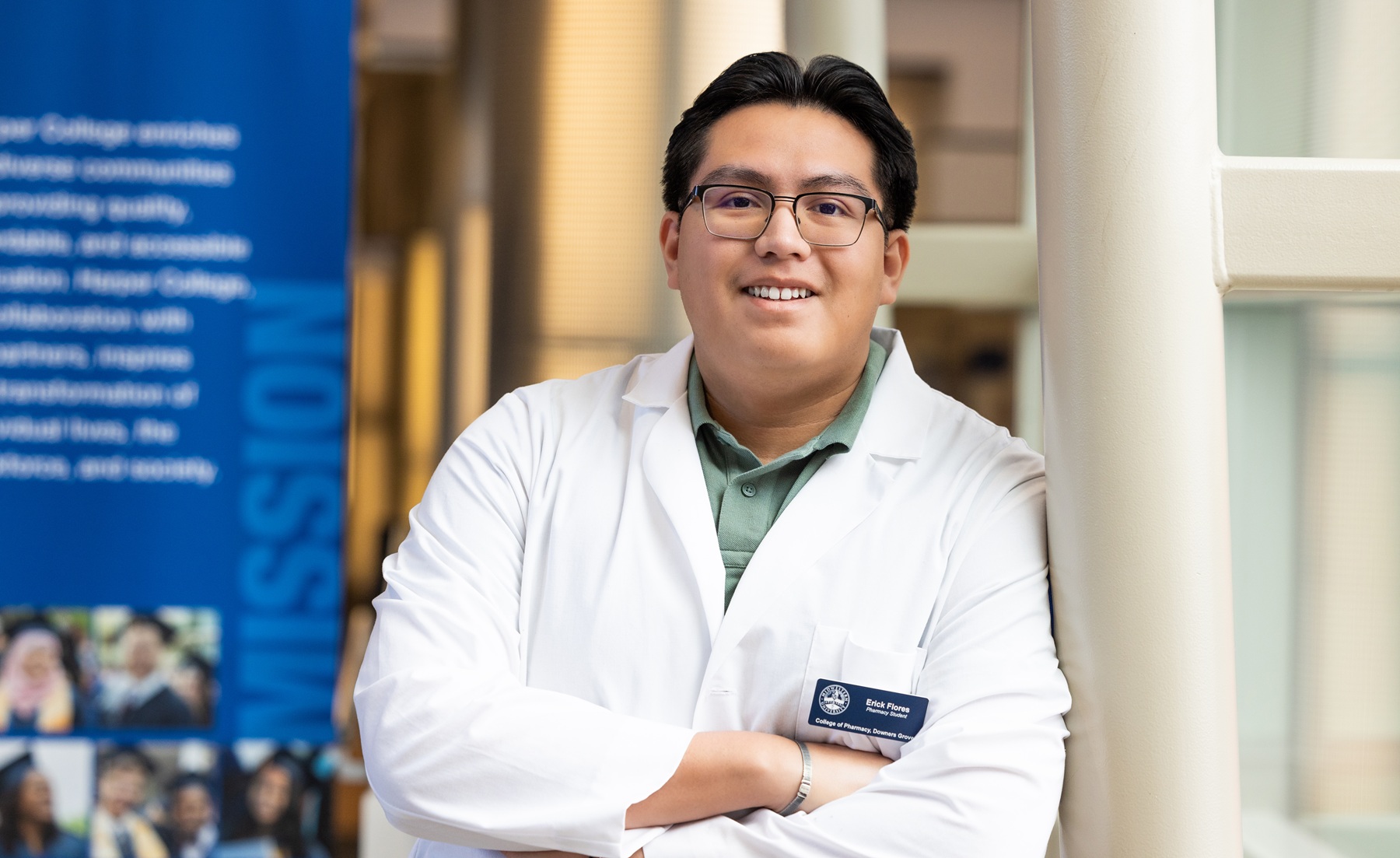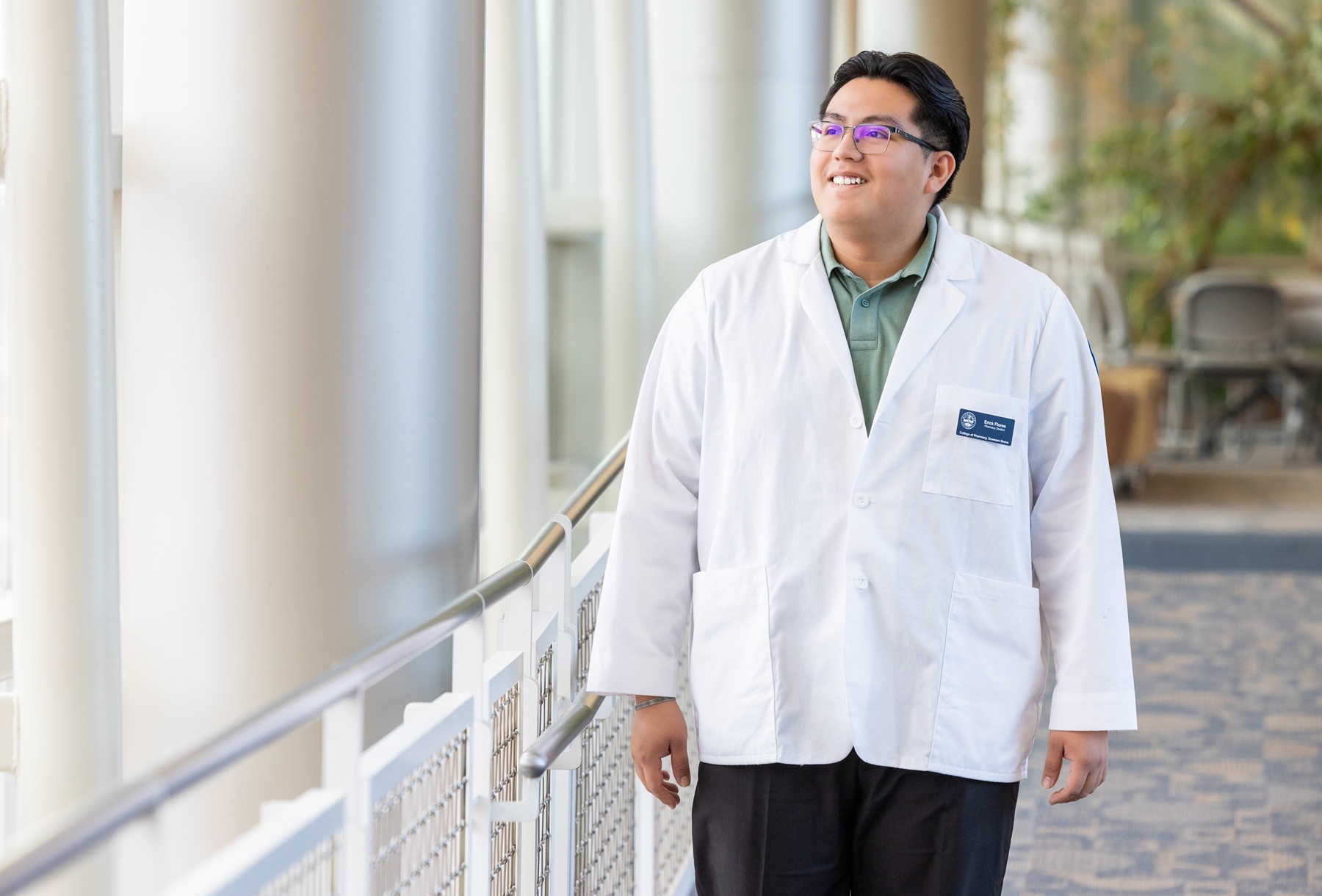Harper College is closed on Friday, April 18, for Reading Day.

 When Harper College alum Erick Flores walked across the commencement stage in 2018,
he earned associate degrees in science, general studies and art, and was already working
in his field. He had previously earned a Certified Nursing Assistant (CNA) certificate from Harper in his senior year of high school. Raised by recent immigrants to the
U.S., Erick says his route to success was clear thanks to an early connection his
mother made to Harper.
When Harper College alum Erick Flores walked across the commencement stage in 2018,
he earned associate degrees in science, general studies and art, and was already working
in his field. He had previously earned a Certified Nursing Assistant (CNA) certificate from Harper in his senior year of high school. Raised by recent immigrants to the
U.S., Erick says his route to success was clear thanks to an early connection his
mother made to Harper.
“Both of my parents came from Mexico. We didn’t really speak English at the house because no one really knew how,” Erick said. “I was 3 years old when my mom was looking to start taking English classes. People told her about the Community Resource Center and Partners for Our Communities. We ended up discovering all of the opportunities there. The main one was enrolling in Harper College classes. That started the whole journey. Harper’s role, along with the Community Resource Center, changed all of our lives for the better.”
Harper provides English literacy acquisition (ELA) and High School Diploma classes at the Community Resource Center in Palatine through its partnership with Partners for Our Communities (POC), a Palatine-based nonprofit that partners with Endeavor Health Northwest Community Hospital and other organizations to offer programs and connect underserved and immigrant families in north suburban Cook County with much-needed resources.
POC is a two-time recipient of Harper’s Community Innovation Fund Grant, which provides grants to nonprofit organizations in Harper’s district that support equity, diversity and economic mobility. The grant program launched in 2022, following philanthropist MacKenzie Scott’s $18 million grant to Harper in 2021.
“The partnership between Harper and POC is one of care, commitment and educational attainment,” said Dr. Joanne Ivory, dean of career and technical programs at Harper. “In addition to providing students with ELA classes taught by Harper faculty, this relationship also provides multiple supportive services to assist in preparing students for the workforce.”
Karen Baker, system director of community impact and engagement at Endeavor Health, who also oversees the Community Resource Center, said Harper’s ELA classes are vital for the immigrant community.
“We have so many newcomers who can’t even read and write in their own language and are starting at very low literacy levels,” Karen said. “So, this is a way to help them become vibrant members of the community and give them the tools they need to get good jobs and afford housing and food and better their opportunities for their families. Having Harper at the center is extremely important.”
Individuals taking Harper’s ELA classes are eligible to receive free child care at the Community Resource Center. Erick said having child care at the resource center was life-changing: “Had it not been for the child care services, my mom probably would have hesitated to enroll in the classes, but knowing that we could both be in the same place and that we were both in a safe space really did it for me and my family.”
As his mother completed classes, she enrolled Erick in every program available to him, from preschool to POC’s ICompete programs for older kids, which participated in Experience Day events at Harper, allowing him to visit a college campus for the first time.

“My favorite part was touring the nursing and dental areas,” Erick said. “Having a chance to see Harper early on allowed me to familiarize myself with the programs that they had and the idea of going to school there.”
By the time Erick reached middle school, he started giving back, volunteering to help pass out lunches to kids in one of POC’s summer programs.
“The good feeling that came from knowing you could create a smile on children’s faces and parents’ faces and the thank-yous they give you really inspired me to continue to do it, and since that age, I never really stopped giving back,” he said. “It inspired me to eventually become a health care professional.”
A combination of advanced placement and dual credit classes taken through Harper earned Erick 36 college credits and a CNA certificate by the time he graduated high school. He went on to attend Harper, which he said was the “best decision” and that he would do it again if he could.
“Harper offered all of the science classes that I needed,” Erick said. “Having such large biology and chemistry departments made a big difference in the amount of classes I could take there. The affordability of the courses compared to other colleges and universities and being able to transfer the credits was huge for me.”
Erick later transferred to the University of Illinois Chicago, where he earned a bachelor’s degree in biology. After graduation, he began working to support recent immigrants, first as a teaching assistant at the Township High School District 211 Adult Night School and then as a student services specialist in Harper’s Adult Educational Development Department. He later returned to POC, where his work helping immigrants navigate the health care system as a health and wellness manager cemented his desire to work in medicine.
“We work very closely with Northwest Community Hospital, and I got to see the mental health crisis firsthand,” he said. “Having people in front of me as a case manager and trying to get creative with different ways that they can get help ... saying, ‘You know what? I do have something to help this person.’ That’s what got the ball moving again with medicine and healthcare for me.”
Today, Erick is studying to receive his Doctor of Pharmacy from Midwestern University and become a clinical pharmacist. He’s an assistant director of operations for POC, working with a team to support Community Resource Center programs and special events, and the program supervisor of POC’s ICompete youth program, where he mentors youth and works alongside the program coordinator to make sure the program provides what the community needs.
“I feel like I’ve come full circle,” Erick said. “I have a group of young middle schoolers that I call future leaders. The idea came from me getting involved from such a young age. I think we should try to nurture them and watch them grow. The idea is that one day, when they are old enough, they can have an opportunity similar to mine.”